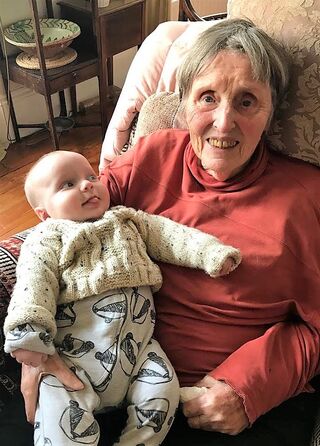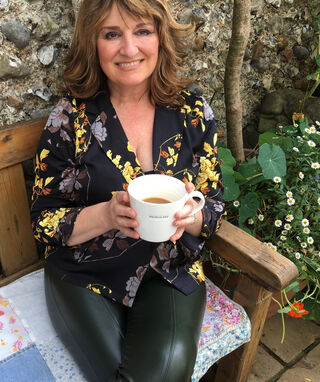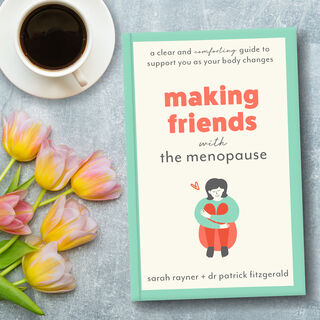Menopause
How Can Making Friends With The Menopause Ease Symptoms?
Understanding is key to feeling better, from hot sweats to loss of libido.
Posted July 4, 2022 Reviewed by Vanessa Lancaster
Key points
- It's so easy to get so caught up in the cult of youth that we can forget there is beauty in age.
- Denial or fighting what is normal and natural won't help.
- Knowledge is power, and being okay with stopping menstruating and growing older is the key to feeling better.
"Making friends with the menopause?" I hear you scoff, dear reader. "How on earth can I befriend a time of life that leaves me feeling so awful?"
Pray, hear me out. After all, what are friends, if not people who know us well and like us and whom we know and like in return? Of course, our friends annoy us, and vice versa, but if we respond to the menopause as if it is our enemy or by wishing it away, it's unlikely to help with any symptoms we might have.

For me, Making Friends with the Menopause is a way of looking at this time of life. A way that says it's okay to have stopped menstruating, to be an older person, to have lines and liver spots, grey hair, and crepe-y thighs.
There Is Beauty in Age
It's so easy to get so caught up in the cult of youth that we can forget there is beauty in age. Carl Yung saw the house as a mirror of the psyche,1 and as older people, our joints might creak, and our midriffs might bear the hallmarks of childbirth.
Yet I'll take a drafty Georgian window over a hermetically sealed one any day, an old staircase worn by the footsteps of others, a frontage covered in wisteria it has taken years to grow.
I like old houses, with all their history, that sense of others having trodden the same floorboards centuries before me. I imagine their lives lived out in the same space, in different circumstances. I wonder who they loved, their work, and what made them laugh and cry.
Tourists clamor to view ancient architecture, but we seldom apply the same curiosity to our own aging.
I'm not alone in seeing the beauty of historic buildings: visitors to London queue to get into The Tower of London, and we gasp in awe at the Great Wall of China and the Pyramids.

Yet somehow, we fail to apply the same curiosity to our aging bodies. Unsurprising maybe, as it means contemplating our own mortality, and with the thought of death comes fear. And for women especially, being able to breed has been tied in with our worth for millennia, so it is almost impossible to imagine a society where being of childbearing age isn't deemed somehow more valuable, better.
As women, the menopause is one of the biggest changes we go through
Mood swings, itchy skin, hot flushes, night sweats, insomnia, weight gain, loss of libido, exhaustion–there is a myriad of ways in which the drop in hormones that occurs around the menopause can impact us mentally and physically.
The trouble is denial is the opposite of understanding. The longer we put our collective heads in the sand, the less we learn and the more stuck we become. This is why it's important to break the taboo around talking about the menopause.
Myth-Busting Matters
My general practitioner friend, Patrick Fitzgerald, is as dedicated to myth-busting as I am. Together, we have researched the subject in-depth to give women what we felt was missing: a clear, comforting, and concise guide to support them as their bodies changed.
Anxiety and depression are common at this time in women's lives. This made it important to us not to be overwhelming regarding the information provided. We wanted to take away the fear and give women an overview so they could make informed decisions about treatments alongside their clinicians. The result is a book and an online peer support group, both called Making Friends with the Menopause.

The menopause is a natural and normal part of aging.
Each woman is different, and there isn't the space to go into all the different ways the menopause might impact you here. Moreover, our research has not led us to believe we can "cure" each and every symptom. We can offer an overview because knowledge is power, and, as women, arming ourselves with information is the first step to feeling better.
Some women prefer not to take HRT, for instance, or can't due to risks caused by their medical history. But that doesn't mean there are no alternatives. And who would have guessed that when it comes to hot flushes, active exercise really helps? It seems counterintuitive, but research2 shows this to be so.
The menopause and the time around it may make some of us uncomfortable, and others suffer significantly. Still, it's important to remember that it doesn't last forever and for the vast majority of women, symptoms ease over time.

When I went through the menopause, I thought I was going mad.
When our book was first published in 2015, the menopause was not yet recognized by NICE, the UK's National Institute for Clinical Excellence. Doctors were left floundering, unsure how to treat women at this time of change, just as we women floundered ourselves, hormones fluctuating, mental health in peril.
Ten years ago, when I was perimenopausal, my anxiety went through the roof. I was convinced I was going mad, and my physician prescribed antidepressants, not HRT.
NICE was founded in 1999. Yet it took another 17 years before doctors were given guidelines on the menopause. Thankfully, times have changed, and there have been advances in treatments. HRT has evolved; there are far more options, making it increasingly popular. Moreover, we've become much more open about the subject. Awareness has risen, and hurrah for that!
A new book for a new readership who are more open than before.
Along with the team at Bookouture, our new publisher, Patrick, and I have spent months honing a brand new edition of Making Friends of the Menopause for a new group of readers. The clinical advice is bang up to date, and the design is easier to read in both print and ebook–a boon for middle-aged eyes! There are fresh insights from women about their experiences, and it is packed with new tips and advice. Now more than ever, with so many stressors upon us, we need to be compassionate to ourselves and others.

We hope you find this new-yet-old book helpful; it helps you navigate this profound change and fully embrace this new chapter of your life with open arms. And remember, there is a support group, which is 'closed' so only members can read posts.
References
The ebook is out now on Amazon worldwide. The edition can be read on any PC, tablet, or smartphone, and it also comes in paperback and audio.
Support group can be found here on Facebook. I'm amazed at what a compassionate and helpful group it is, how supportive the members are of one another, although I shouldn't be–it is called Making Friends with the Menopause, after all.




